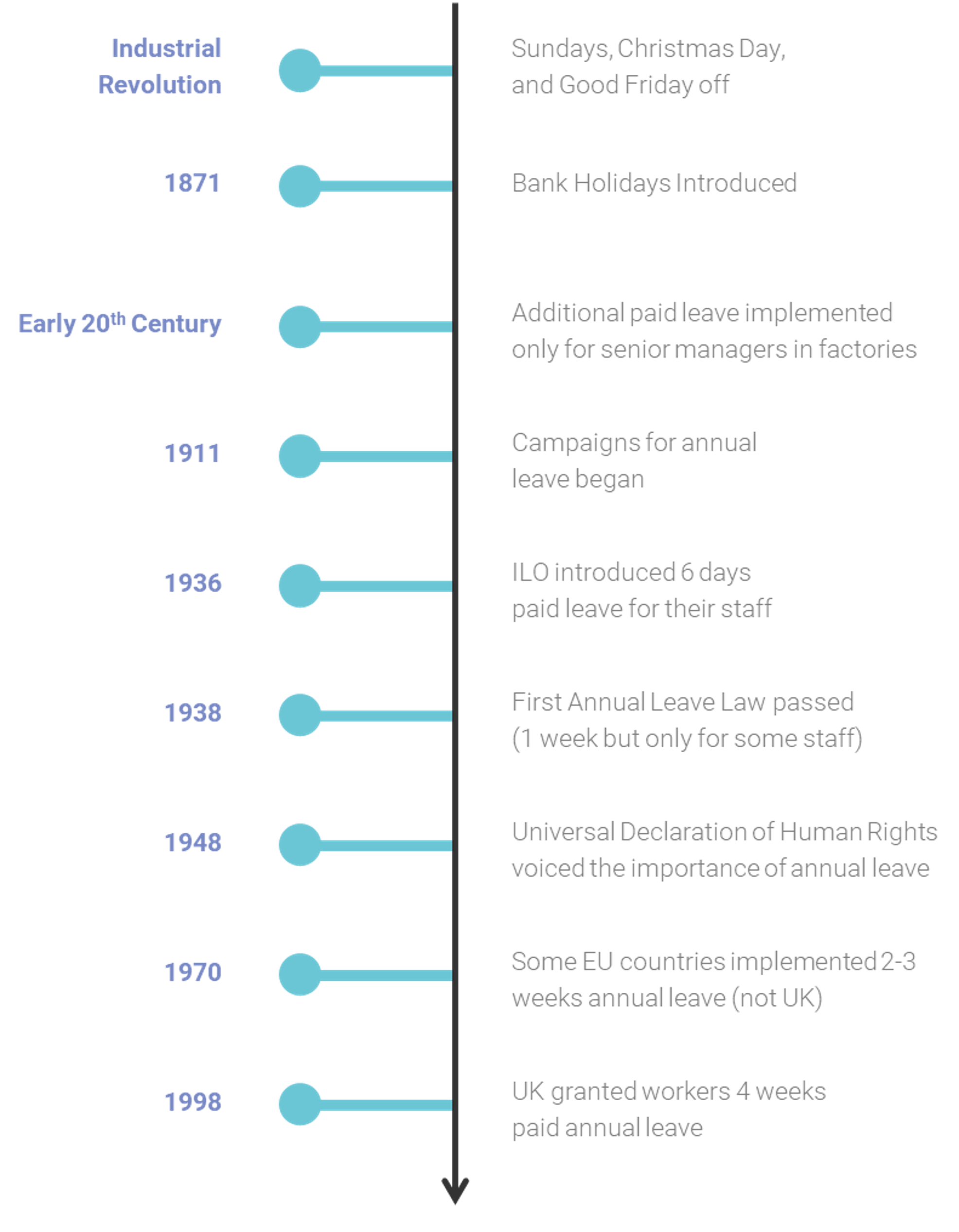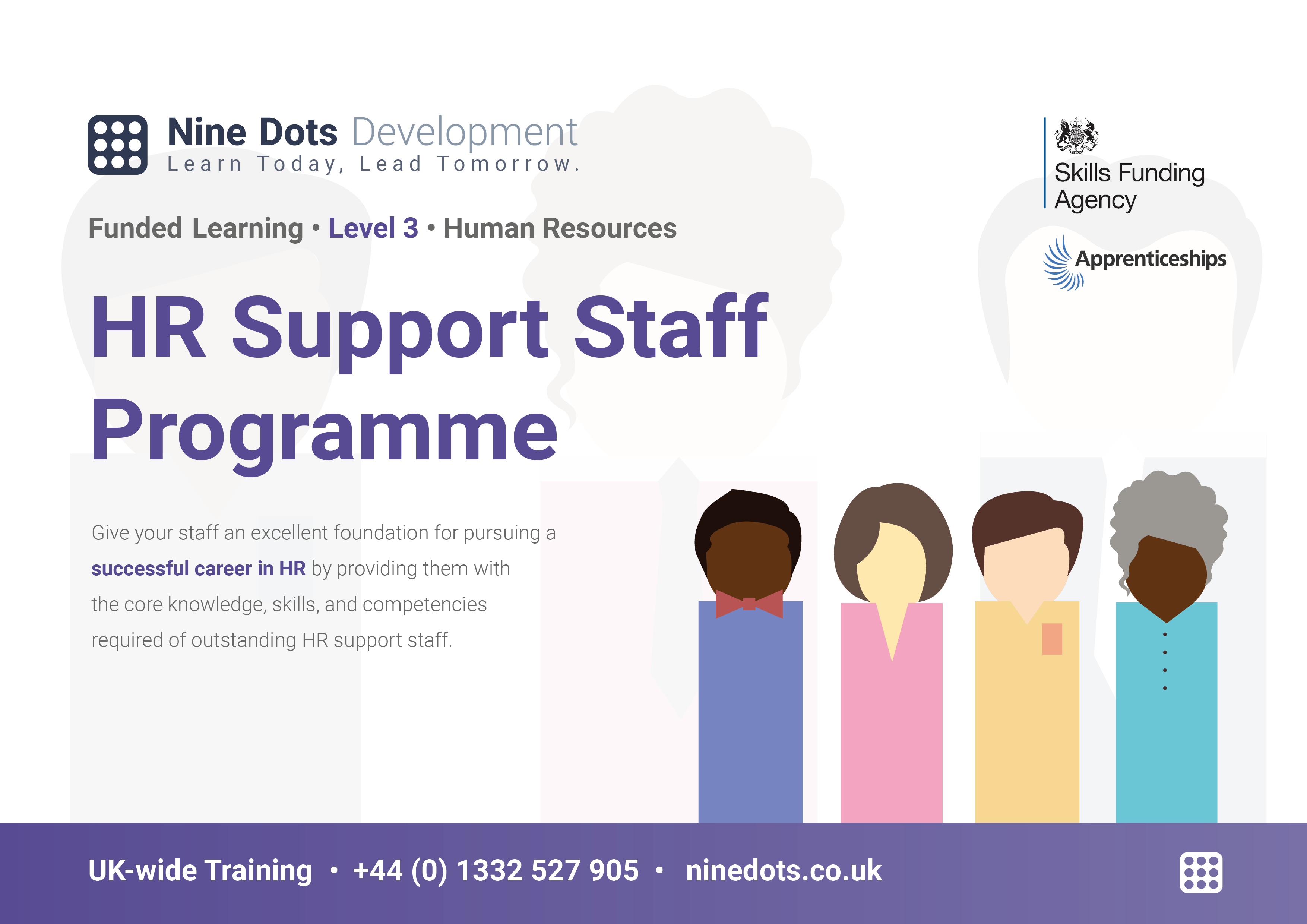Friday 23 Jul 2021 Article
The TakeawayRevealing the True History of Annual Leave/Bank Holidays
The Importance of Annual Leave
Part 2 of 2
#HR #Apprenticeships #AnnualLeave #Bank Holidays #PeopleDevelopment
The perfectly matched resource for this article...
Explore Our HR Support Staff Apprenticeship Brochure!
Please click here to download our HR Support Staff Apprenticeship brochure! This programme teaches staff all of the fundamentals of HR and how to provide fully compliant HR advice; it also includes CIPD Membership which is crucial for any HR professional.
Download brochure!Playing catchup?
Revealing the True History of Annual Leave/Bank Holidays
How have annual leave laws evolved over the years? Where did bank holidays come from? Why did Richard Branson allow his staff at Virgin unlimited annual leave?
In this mini-article series, we discuss all things annual leave-related. If you missed our previous article about why it’s crucial to take time off work and 10 tips you may not know about annual leave, you can click here to catch up with that article.
So what is the true history of annual leave and bank holidays?
The Fight for Annual Leave
In most countries, there is now a statutory entitlement to paid leave. These are the 5 top countries for annual leave:
- Austria - 30 days + 14 public holidays (44)
- Brazil - 30 days + 13 public holidays (43)
- Russia - 28 days + 14 public holidays (42)
- France - 30 days +11 public holidays (41)
- Panama - 30 days + 10 public holidays (40)
However, this wasn’t always the case…

- Industrial Revolution
Shortly after the Industrial Revolution, workers were granted Sunday’s off as well as two religious holidays - Christmas and Good Friday. - 1871 (The Origin of Bank Holidays)
Sir John Lubbock, scientific writer, banker, and politician, created the Bank Holiday Bill which became the first bank holiday law. Initially, it was just banks and financial buildings that were closed on these days - this is where the name ‘Bank Holiday’ comes from. - Early 20th Century
Paid leave was granted for only senior managers and supervisors in UK factories; the number of days granted varied per company. - 1911
As annual leave became a growing concern among UK staff, The Trade Union Congress began campaigning for paid holiday for workers. - 1936
One company, International Labour Organisation, adopted the ‘Holidays with Pay’ convention, allowing workers 6 days of paid leave after one year of continuous service. - 1938
The first law on paid leave was passed, stating that workers whose “minimum rates of wages were fixed by trade boards” were entitled to 1 week of annual leave. - 1948
However, this law only covered a small proportion of workers, so the Universal Declaration of Human Rights spoke out, stating that “everyone has the right to rest and leisure, including reasonable limitation of working hours and periodic holidays with pay”. - 1970
ILO (International Labour Organisation) increased their annual leave policy and recommended a minimum of 3 weeks paid leave for workers. Following this advice, many EU countries implemented a statutory right to 2-3 weeks paid leave - but not the UK. - 1998
In 1998, the UK Labour government finally implemented the ‘EU Working Time Regulations’, granting workers 4 weeks paid annual leave.
As this timeline shows, it took over 120 years of campaigning for annual leave to become a statutory right. In the first 80 years, progress was extremely slow and then, in the last 40 or so years, the UK made a drastic change and quadrupled workers’ annual leave entitlement, suggesting that the importance of annual leave suddenly became evident to them, causing them to act quickly.
{{ADVERT}}
Why Richard Branson Scrapped Virgin’s Annual Leave Policy?
On September 23rd 2014, Richard Branson, owner of Virgin Media, published an article that revealed that he was scrapping Virgin’s existing annual leave policy and instead, allowing his staff to "take off whenever they want for as long as they want". In his article, he stated that he made this bold move because of an article his daughter had forwarded to him about how Netflix had made a very similar decision.
"It is left to the employee alone to decide if and when he or she feels like taking a few hours, a day, a week or a month off, the assumption being that they are only going to do it when they feel 100% comfortable that they and their team are up to date on every project and that their absence will not in any way damage the business - or, for that matter, their careers! We should focus on what people get done, not on how many hours or days worked. Just as we don't have a nine-to-five policy, we don't need a vacation policy."
Keeping Up with HR Laws and Policies
As the majority of organisations continue to grow and expand, and as staff are becoming much more aware of their entitlements, it’s more important now than ever to ensure that your organisation keeps up with ever-changing HR laws and policies. It’s especially important to give HR extra thought and consideration as we leave the EU as there is an extremely high chance that some HR-related laws will change.
One of the most effective ways of doing this is to have a dedicated, trained HR specialist who solely focuses on HR and ensuring your organisation is fully compliant with all existing and future legislation. It is also recommended for HR staff to acquire CIPD membership to help them keep up with the latest rules and regulations.
If you have an existing but untrained HR practitioner in your organisation, or a new hire that you’d like to develop into a HR role, our HR Support Staff Apprenticeship would teach them all of the fundamentals of HR and how to provide fully compliant HR advice. Our HR apprenticeship also includes CIPD Membership which is crucial for any HR professional.
As with the rest of our apprenticeships, we can access up to 95% funding from the UK Government to help pay for the cost of the programme, meaning employers only pay a 5% contribution.
You can download our HR Support Staff Apprenticeship brochure by clicking here or clicking the button below.
---
We hope that you found this 2-part article series about The Importance of Annual Leave helpful and have learnt something new.
Until next time...
Explore Our HR Support Staff Apprenticeship Brochure!
Please click here to download our HR Support Staff Apprenticeship brochure! This programme teaches staff all of the fundamentals of HR and how to provide fully compliant HR advice; it also includes CIPD Membership which is crucial for any HR professional.
Download brochure!Missed an article?
More from The Importance of Annual Leave
